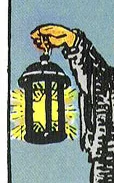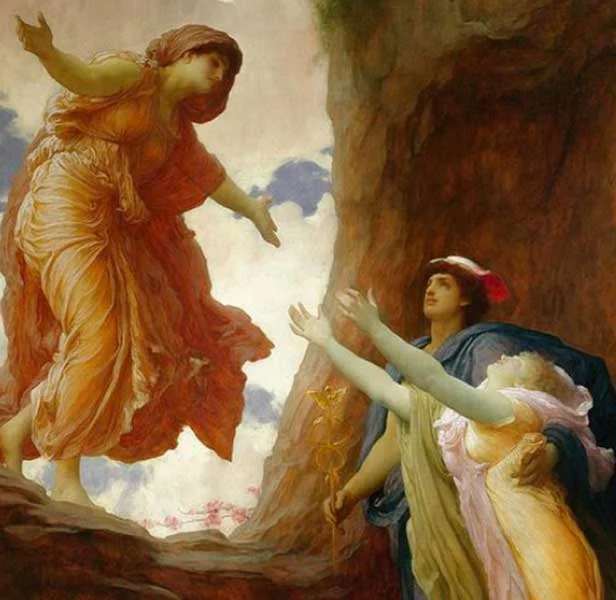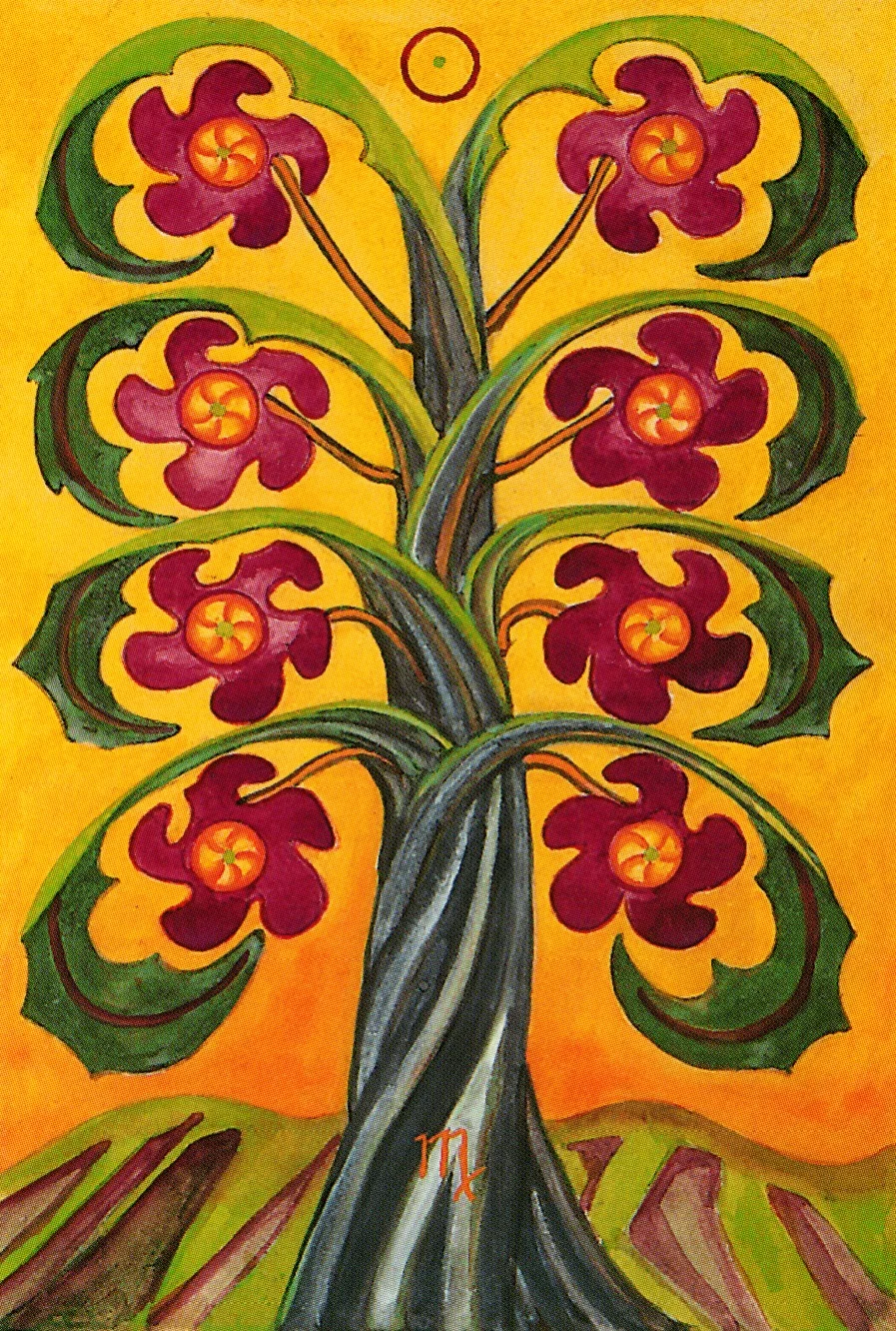8 of Pentacles: Virgo I
Decan ruler (Chaldean): Sun
Hermetic Title: Prudence
Corresponding major arcana: The Sun [Sun] + The Hermit [Virgo]
Dates: August 23 - September 1
The captive Sun.
After the desperate measures of the 7 of Wands, we emerge into a drama-free scene of well-lit industry and Zen-like focus. Some consider the 8 of Pentacles to be a crashing bore, but it is my natal decan and I beg to differ! Though each of the artisan's pentacles may appear identical, you can be certain he is honing his craft incrementally with each one. Every detail is another opportunity to hunt down the ideal. He is lost in the trance of perfection. He sees only the work before him, but in that work resides the world entire.
In the light it casts, details grow brighter, clearer, more in focus. Distinctions formerly too small to notice swim into view. It’s a kind of productive myopia, you could say. The selflessness of the Hermit is not self-loathing - it's the erasure or disappearance of the observer when the observed fills the frame. Why is Virgo so famous for hard work? Because any task can be borne if you look at it closely enough; there is fascination and beauty to be found in the inner workings of anything.
Also interestingly Virgo-ish is the phrase "hanging a lantern on it" - to acknowledge a point of view in order to dismiss it ("Yes, I've already thought of that, so please let's not rehash the obvious when I'm trying to say something that goes a step further"). In conversation or argument, Virgo seeks to go beyond the first apparent response, in favor of hunting down deeper strata and subtler senses. This can come across as nit-picking and critical. Not everyone wants to go there with Virgo!
The Sun's Passage Through Night
In the Northern hemisphere, days are shortening noticeably in Virgo. Long summer days dwindle to the point where day and night hold equal sway as we attain the Libra threshold. It is no surprise that the Hermit seeks to conserve the remaining light. In Egyptian mythology, the Sun must travel through the darkness, carried by the dung beetle, until it reaches the eastern horizon to rise again. Just as consciousness abandons us in sleep, just as the light of the waking world deserts us when we die, so does the Sun pass into night and the kingdom of winter.
Gandalf lights the way through the mines of Moria.
Our guide through these dark passages is none other than Hermes psychopomp, for Mercury is the night-time ruler of earthy Virgo. Much about his role is revealed in the beautiful Orphic Hymn to Hermes Chthonios (chthonic" meaning "of the earth" or "underground"). He is linked to the sacrificed god Dionysus, but he also shares the realm of Persephone, who grants him equal access to Tartarus ('ιερον δομον αμφιπολευεις). Into the lightless depths of the earth, Hermes guides the newly dead, for the Hermit knows even forsaken places well, and his ever-present lantern shows the way.
In some early versions of the card, the Hermit holds not a lantern but an hourglass. This evokes the Saturn/Chronos archetype - our Virgo psychopomp is a Saturn-flavored Mercury (in the same way that you might argue Libra features a Saturn-flavored Venus). The Orphic Hymn makes a point of emphasizing that souls descend into the earth when it is their fate to do so; when their time has come ('οποταν μοιρης χρονος εισαφικεται). But it also makes the point that this is in order to wake them up again later. The Sun also rises!
Rites of Demeter
The Hermetic connection to Persephone and the underworld comes to us via the Eleusinian mysteries, the great rites of death and rebirth which dominated the culture of Mycenaean Greece in the centuries before Christianity. In this massive initiatory working, the human cycle of mortality became an agricultural metaphor the human mind could grasp. It is said that at its climax an unripe ear of grain was cut, in silence.
Hermes, Persephone, and Demeter. Yeah, I know, I used this in the 3 of Cups post too. Same story, different card.
In the imagery and significations of the decans, we see many references to the work of growing food and the skills required for it: Picatrix refers to a girl "holding a pomegranate" (very Eleusinian!) and speaks of "sowing, plowing, germinating, gathering grapes and good living"; Agrippa's version adds to this the "getting of wealth," "ordering of diet," and "peopling." This reminds us that when we reap, it may be an ending, but it is also a time of abundance that ensures the next generation may thrive and multiply.
If the harvest is a kind of death, death is also a kind of harvest. What is it that the Grim reaper reaps? When our crops reach maturity, they die and we collect and profit from them. When we ourselves die, we may leave behind inheritances - or we may leave behind achievements, or memories. We'll speak more of this when we get to Virgo III, the 10 of Disks, where legacies abound.
Virgo I, getting his hands dirty.
The decan commentators seem to be of one mind about the Virgo I protagonist's fashion sense, or lack of it. They describe "covering the body with dirty raiment", "a maiden wrapped in a cloak and wearing worn out clothes," "covered in an old woolen cloth". When are clothes dirty? When one is working on the land (recall the roots of "humility" lie in "humus," literal dirt) - or when one is wrapped in a shroud. It also brings to mind the concealment of Demeter. In her quest to find her daughter, the goddess walked among mortals disguised, concealing her radiance with a cloak.
Spheres of Prophecy
On the Tree of Life, Netzach and Hod are the 7th and 8th sephiroth. These are sometimes called the "hosts" or "armies" of God, and are associated with his messengers, the angels (Gk. αγγελος literally means "messenger"). For that reason they are also called the "spheres of prophecy" in traditional Kabbalah, for they are the channels through which we receive divine guidance. It may be angels, it may be the Holy Spirit, it may be spirits with a small "s".
And that guidance is of two kinds. The spheres of prophecy are known as the "hazy and clear mirror". Netzach is the "clear mirror" - the direct communication, the vision, the charismatic inspiration that sends saints, fanatics, and warriors on their missions and gives them the will or stamina to press onward.
But Hod - the 8th sephira and therefore the one that is relevant for our 8 of Pentacles - is the "hazy mirror". It is a place of humility and indirection, where the messages one receives are clouded by filters. We are talking about dreams and divination here. Thus Hod requires interpretation. And who is the lord of interpretation? Hermes/Mercury himself! He is literally known as 'ερμηνευ παντων, the 'interpreter of all'. So to me, the 8 of Pentacles is a place of divination. As the artisan works on his pentacle and his ego, his desire nature, falls away, he finds in its engraving messages and knowledge accessible only to the wise.
In the Golden Dawn system, Hod is ruled by Mercury. When ceremonial magicians observe the Lesser Banishing Ritual of the Pentagram, they stand at "the intersection of Samekh and Pe," where the Tower and Temperance cross. The Tower's path runs between the spheres of prophecy, Hod and Netzach. Now, as everyone knows, the Golden Dawn correspondences were late and, some might say, bogus, additions to the Kabbalistic canon. Nevertheless, the arts of hermetic interpretation cohere in this constellation of correspondences, because sometimes the truth comes in distorted guise. Hazy mirror indeed!
The Measure of Reality
The 8 of Pentacles is known as the Lord of "Prudence," a term worth examining more closely. Little esteemed in the modern context (or even ridiculed - recall Dana Carvey's spoof of President Bush Sr.? "Wouldn't be prudent...!"), Prudence is the first of the cardinal virtues. The others are Fortitude, Temperance, and Justice, which clearly have counterparts in tarot (Fortitude as 'Strength'), But which major corresponds to Prudence?
Robert Place’s take on the Fool and the World, in the Tarot of the Sevenfold Mystery.
Robert Place suggests that 'Prudence' is the World. This makes sense, for in Christian theology, prudence is the knowledge of reality. It is a prerequisite for the successful application of the other three virtues. Prudence teaches us how to pick our battles; prudence tells us how to crusade effectively for justice. As the late, great Ruth Bader Ginsburg said: "Fight for the things that you care about, but do it in a way that will lead others to join you."
Prudence is a form of good judgment based on seeing the world as it truly is. Thus, in his Sevenfold Mystery, Robert Place represents the fool as "Stultitia," or "ignorance"; her life journey will transform her into Prudence, the World.
If the World card represents Prudence as archetypal good judgment, the 8 of Pentacles represents a quality of mindfulness applied to everyday matters; an integrity of outlook based on how things really work, rather than how we wish they did.
This harmonious ordering of life produces works of proportion and symmetry, and promotes health and balance. With the right amount of sun, rain, breeze, and soil, a tree can take root, grow strong, and bear fruit. It is a process which is largely invisible but essential for life, and we can see it clearly on the Thoth version of the 8 of Disks.
The Takeaway
When you draw the 8 of Pentacles, it is time to harvest your own light - what talents and skills do you have to offer the world, and what can you do to perfect them? Perhaps you think you have none, but the Hermit's gift is time and humility: through focused effort, you can achieve more than you thought. The works of the 8 of Pentacles are not flashy, but they are perfectly proportioned; it is that rightness in all things that makes the machine (body, artifact, or life) run smoothly. No detail is too small for your attention. We may seek the thrill of public recognition at times, but equally important is the satisfaction of quiet competence. That satisfaction can be found in tasks as small as sweeping the porch, making your bed, or folding your laundry; it can equally be found in polishing your manuscript, tuning up your car, streamlining your process. Learn to love the backstage, for in obscurity, the hidden light is burnished to its greatest shine.
What I do every day
Is nothing special:
I simply stumble around,
What I do is not thought out,
Where I go is unplanned.
No matter who tries to leave their mark,
The hills and dales are not impressed.
Collecting firewood and carrying water
Are prayers that reach the gods.
- The Sayings of Layman P'ang: A Zen Classic of China, tr. James Green







